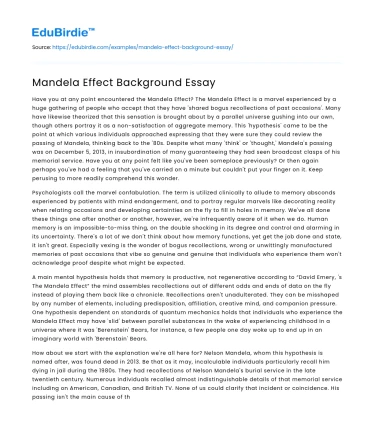Introduction
The Mandela Effect is a phenomenon where a large group of people remembers an event differently from how it occurred. It is named after Nelson Mandela because of the widespread false memory of his death in the 1980s, despite his actual death occurring in 2013. This intriguing phenomenon raises significant questions about the reliability of human memory and the factors influencing collective memory errors. The Mandela Effect has captured the interest of psychologists, neuroscientists, and the general public, sparking debates about the nature of memory and reality. As we delve into the causes and implications of the Mandela Effect, it becomes essential to examine both the scientific explanations and the cultural impact of these collective misrememberings.
Scientific Explanations for the Mandela Effect
At the heart of the Mandela Effect lies the fallibility of human memory, a subject extensively studied in cognitive psychology. Memory is not a perfect recording of events but a reconstructive process that can be influenced by various factors. One explanation for the Mandela Effect is the concept of "confabulation," where the brain fills in gaps in memory with fabricated details, leading to false recollections. According to Dr. Elizabeth Loftus, a leading expert on human memory, memories are susceptible to suggestion and misinformation, which can alter how we remember past events (Loftus, 2005).
Save your time!
We can take care of your essay
- Proper editing and formatting
- Free revision, title page, and bibliography
- Flexible prices and money-back guarantee
Another contributing factor is the role of cognitive biases, particularly the "confirmation bias," where individuals favor information that confirms their existing beliefs. When a person's memory of an event aligns with what they expect to have happened, they are more likely to accept it as true, even if it is inaccurate. This bias can lead to the reinforcement of false memories within groups, further spreading the Mandela Effect. Additionally, the phenomenon of "source monitoring errors" occurs when people mistake the origin of a memory, confusing something they read or heard with their own experiences (Johnson et al., 1993).
Neurological research also provides insights into the Mandela Effect. Studies have shown that the brain's hippocampus, responsible for forming and retrieving memories, can sometimes inaccurately encode and recall information. This process can result in the blending of real and imagined events, leading to shared false memories among individuals. The complexity of the human memory system suggests that the Mandela Effect is a natural consequence of the brain's attempt to construct a coherent narrative from incomplete and flawed data.
Cultural and Social Influences on Collective Memory
While scientific explanations provide a foundation for understanding the Mandela Effect, cultural and social factors also play a crucial role in shaping collective memory. The spread of information through media and the internet can amplify and perpetuate false memories. Social media platforms, in particular, allow for rapid dissemination and reinforcement of incorrect information, as users share and discuss their experiences with others. This interaction can create an echo chamber in which false memories are validated and strengthened.
The Mandela Effect often involves popular culture references, such as movie lines, brand logos, and historical events, which are frequently subject to reinterpretation and distortion over time. For example, many people misremember the line "Luke, I am your father" from the movie "Star Wars: The Empire Strikes Back," when the actual line is "No, I am your father." These misquotes become ingrained in public consciousness, perpetuated by repetition in various media formats, leading to widespread acceptance of the incorrect version.
Furthermore, the Mandela Effect can be influenced by the human tendency to seek meaning and patterns in the world. When individuals encounter discrepancies between their memories and reality, they may construct elaborate theories to explain the differences, such as alternate realities or parallel universes. This desire for explanation can further cement false memories as individuals become more invested in their interpretations of events, despite evidence to the contrary.
Counter-Arguments and Skepticism
Despite the compelling narratives surrounding the Mandela Effect, some skeptics argue that it is merely a collection of cognitive errors and does not warrant the attention it receives. They contend that the phenomenon is simply a testament to the limitations of human memory, which is well-documented in psychological research. According to skeptics, attributing these memory errors to extraordinary explanations detracts from the real understanding of memory processes and the importance of critical thinking.
Moreover, critics point out that the Mandela Effect is often fueled by anecdotal evidence rather than empirical research. They caution against overgeneralizing the experiences of individuals to explain broader phenomena without scientific validation. While acknowledging the existence of shared false memories, skeptics emphasize the need for rigorous examination before accepting speculative theories about their origins.
Despite these counter-arguments, the Mandela Effect remains a fascinating topic for further exploration. It serves as a reminder of the complexities of human cognition and the importance of questioning our perceptions of reality. By examining both the scientific and cultural dimensions of the Mandela Effect, researchers can gain a deeper understanding of how collective memories are formed and maintained.
Conclusion
The Mandela Effect demonstrates the intricacies of human memory and the influence of cultural and social factors on collective recollections. While scientific explanations provide insights into the mechanisms behind false memories, the cultural impact of the Mandela Effect underscores the power of shared experiences and media in shaping our perceptions of reality. By considering counter-arguments and remaining open to new evidence, we can continue to unravel the mysteries of memory and cognition.
The Mandela Effect challenges us to reflect on the reliability of our memories and the ways in which information is disseminated and reinforced in society. As we navigate an increasingly interconnected world, understanding the dynamics of collective memory becomes more critical than ever. Through continued research and dialogue, we can gain valuable insights into the human mind and the nature of reality itself.






 Stuck on your essay?
Stuck on your essay?

